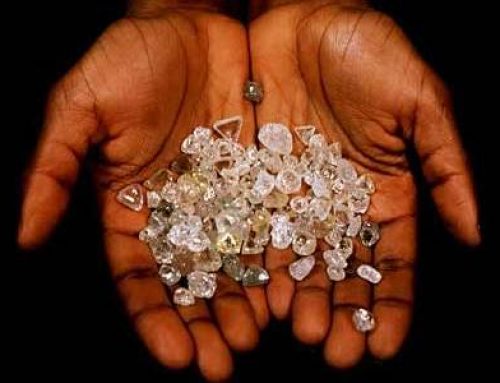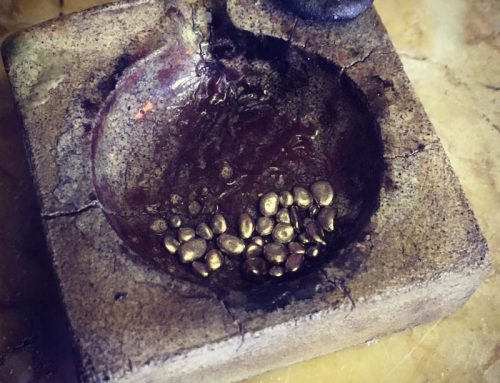On the 12th June, London Jewellery Week entered into the world of ethical jewellery. For the first time at the Treasure Show (the showcase event for design talent) there was an intentional section called Essence, that gathered together the UK’s ethical jewellery talent and gave them all a platform from which to showcase their collections. April Doubleday, Leblas, Oria Jewellery, CRED Jewellery, Ute Decker, Fifi Bijoux, Choo Yilin, Linnie Mclarty and Avasarah were just a few of the designers and brands demonstrating the UK jewellery scene has a growing, vibrant and maturing ethical jewellery scene.
As the host for the ethical debate I opened with a few observations from the past few years. The UK jewellery market has certainly undergone something of a small but significant evolution in its embracing of ethical issues as a core part of the supply chain in the last five years. With traceability, fairtrade, ethics, human rights, environmental issues and recycling all becoming part of the language of jewellery in the UK we have seen a shift in understanding and acceptance that ethics is an integral part of what brings value to a piece of jewellery. However more significantly than a shift in language has been the emergence of a number of key networks, organisations and institutions whose aim is to play their part in the delivery of social and environmental justice throughout the jewellery supply chain. Fairtrade Labeling Organisation, Alliance for Responsible Mining, Diamond Development Initiative, Responsible Jewellery Council, National Association of Goldsmiths new supply chain ethics working group and many others are beginning to play their significant part in transforming the injustices in the jewellery supply chain to a more equitable system. There is real traction now in the industry to drive a values revolution built upon transparency, sustainability, human rights and environmental justice. In my opinion the UK jewellery sector is leading the way in mine to market relationships.
The ethical debate, the first of its kind for LJW saw Estelle Levin a specialist in sustainable supply chains and small scale mining, Ute Decker a political economics graduate turned excellent sculptural jeweller, Choo Yilin a Thai based jeweller who recently launched a sustainable jewellery label under her name and Christian Cheeseman Designer and Director of the leading ethical jewellery brand CRED all challenged to give their replies to the debate question ” What are the next ethical steps the UK jewellery industry needs to take?’
I summarise their points as follows naturally avoiding any repetition:
Uto Decker
- There is a need for more suppliers of ethical material so there can be more choice.
- Using recycled materials has real value.
Estelle Levin
- She defined ethical as adding more benefits to miners and managing the harms that we do.
- The Environment is a stakeholder in our work and should be considered when taking decisions.
- There needs to be real honesty in marketing jewellery.
- To have major impact we need to focus on small-scale miners.
Choo Yilin
- We need to make sure that what we do is real and not just green-washing our supply chains
Christian Cheesman
- There should be a more deeper understanding of what luxury is all about
- Traceability and transparency are foundational to all ethical claims
- Gemstones and Diamonds should also become Fairtrade certified
In conclusion, despite my continued amazement at how open the UK industry is to delivering more justice through its supply chain, I remain humbled by the scale of the work we need to undertake. There are thousands of jewellers in the UK who are still unengaged in the issues, there is still only a small amount of supply of traceable materials available for jewellers to work with. So there remain huge challenges we will need to engage with in order to sustain the change. But it is a journey and to that end we are all walking. There is true dignity in work that small scale miners do in unearthing the treasures of creation, there is real creative genius in the way the jeweller takes these materials and enhances them in to objects of real beauty



Kudos to Greg and other UK designers & jewelers, continuing the public discourse for socially and environmentally responsible jewelry practices!
You’re leading the way, launching a new standard for jewelry sourcing in the world, making it culturally unacceptable to sell an item of jewelery that is not independently certified as socially and environmentally responsible. (GV) Very inspiring!!
I am so impressed with the passion and work that people are putting into the ethical and sustainable jewellery industry in this country. When I found a company that marketed the fact it used recycled metals bought in this country (and they are a member of the Responsible Jewellery Council) and I asked them for information on that supplier they would not share it with me …… is that hypocritical? Is’nt that is what it is all about? I think we need to educate from the bottom up, from further and higher education, about ethical and sustainable sources …. this generation are far more up for it than previous generations so let’s make the most of it …….. I have told several people about CRED SOURCES and their recycled materials especially in the NW of England and will continue ……….. keep up the good work ……..
Dear Della, thanks for your voice in suprt of the changes the industry needs to embrace. It is a real shame about RJC companies not sharing or disclosing sources. I think this demonstrates what the RJC is all about. I have had the same experience when in discussions with one of their members regarding diamond polishing. It appears RJC is about elements of the industry hiding behind self appointed standards to avoid disclosure. Not good enough…